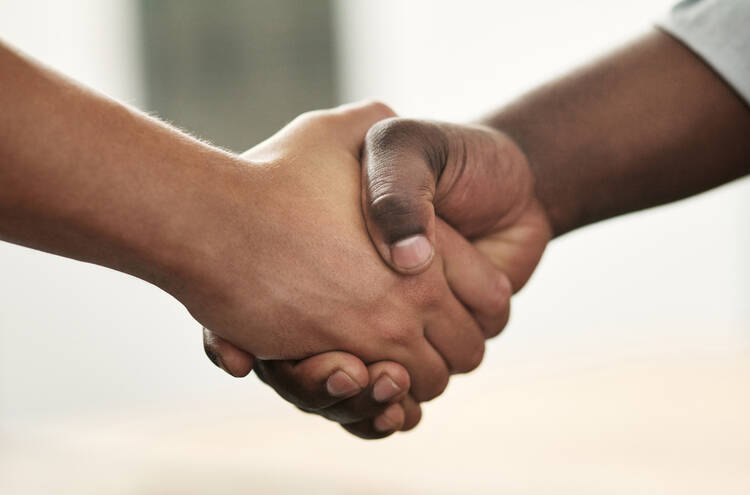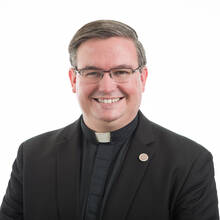Recent heated conversations among Catholic leaders about inclusivity and the church’s teaching on sexual morality, particularly in response to Cardinal Robert W. McElroy’s recent articles on these subjects for America, raise a question: What is the point of the Synod on Synodality?
If the point is clarifying theological debate, then it seems like an inefficient and painful way to rehash old arguments in moral theology. But is that the call of the Spirit to the church right now?
If the point of the synod—and more broadly a synodal way of the church—however, is conversion, then we desperately need that. The universal call to holiness should be at the center of our lives, putting us on mission to God’s beloved throughout the world. Moreover, the cry for unity we hear throughout the synodal process is the same one being choked in too much of the debate: a sense of communion within God’s saving plan for the world, one that allows us to transcend tired polemics, to move beyond our smallness and selfishness.
The synodal process seems like an inefficient and painful way to rehash old arguments in moral theology.
So again, what is the point of the synod?
Synodality in the United States
Two of the most salient features of the U.S. debate around synodality are intimately connected: There is both strong division and a strong desire to overcome that division.
When one reads the synthesis document from the U.S. synodal process, and no doubt from other countries and episcopal conferences, it is easy to see that the wounds are deep, and the pain is real. On the one hand, there are many issues at stake, including clerical sex abuse, the aftermath of the Covid-19 pandemic, inclusion of the divorced and remarried, and the welcoming of L.G.B.T. people.
“The People of God desire to draw closer to God and each other,” the synthesis document from the U.S. synodal process states. But that is not the conversation being held right now.
These are real wounds, ones that make “the simple practice of gathering, praying together, and listening to one another” both urgent and seemingly impossible.
On the other hand, at stake is not any one issue but a deeper question of who and how the church is called to be. “The People of God desire to draw closer to God and each other,” the document states. But that is not the conversation being held right now.
The politics of the both/and
It is worth stating the obvious: The movement toward a more robust synodality was never going to be easy. But synodality’s juxtaposition with fraught issues like sexuality magnifies its contentiousness. It is not surprising that it is in such moments that the Catholic “both/and” breaks down.
Many Catholics enjoy calling themselves the both/and people. The expression gets at something that is beautiful but also hard to realize in practice. In a world riven by false alternatives, Catholics seem called to a special vocation to strive for synthesis, to hold seemingly contradictory truths in tension in the hope that one day their resolution will be made plain in the light of the Truth itself.
And yet when Catholics argue with each other, when the church is polarized and divided, the both/and begins to feel like a tug of war: No one person is advocating for a truly both/and approach but instead is arguing for a side in the argument in a way that cannot transcend and encompass the other positions. We end up being just as divided as the rest of the world.
Cardinal Robert McElroy framed his initial intervention in America on the ongoing synod as a both/and at the deepest level: How do we proclaim the fullness of the Gospel and offer witness to God’s love? But that is not how his words were received. Was the cardinal not really calling us to the both/and? Or do his critics not really believe in that call?
Even in more irenic circumstances, the both/and is more aspiration than reality. But in high-stakes, polemical situations, some Catholics approach the both/and cautiously and transactionally. Many Catholics want it to lead to certain results, if they are to believe that it is authentic. Some partisans of the synodal process, for instance, seem to think that a mark of its authenticity would be significant revisions to church teaching—and anything less would not count as true synodality. Others, less enthusiastic about synodality, are hesitant to endorse the synodal process and want to know that it will not threaten settled teachings.
How many are willing to have their minds changed, to desire for something from this synodal process that goes deeper than their pre-existing agenda?
But synodality is not a process for strategically securing outcomes. The fruit of the synodal process is a more synodal church. To use the synodal process for extrinsic results is a betrayal of the communion Pope Francis is leading us toward. This is why leaders like Cardinal Michael Czerny have urged that the point of synodality is not predetermined outcomes: The pope “does not have pre-packaged ideas to apply to the real world, nor an ideological plan of ready-made reforms,” nor “strategies conceived on the drawing board” to “obtain better statistical results.”
This is an important message for Pope Francis’ cheerleaders as well as his critics. I have argued in the past that many of Pope Francis’ defenders are looking for specific outcomes from his papacy. One can certainly hope for them, and one should without a doubt evaluate Francis’ papacy as a ministry. But how many are willing to be converted by him? How many are willing to have their minds changed, to desire for something from this process that goes deeper than their pre-existing agenda?
This is not to deny that the synodal process will result in concrete outcomes. But those outcomes will overflow from how the conversion of synodality helps us to become better, not because it gives us better policy prescriptions.
I, for one, do not think it useful or helpful to assume bad faith on the part of Cardinal McElroy or any of his critics. But I do agree with Michael Sean Winters that this outcome was very predictable. When we talk about levels of inclusion for divorced and remarried people or L.G.B.T. people in the church, we are also touching on what have been deeply explosive issues in recent church history, sex and sexuality, and we are also dealing with a situation where ecclesial unity is already deeply fragile. We need to walk together, and that “together” includes both those concerned that church teaching could be distorted and those who feel wounded by that teaching. And the very need to walk together is being lost in arguments over how to do so.
Conversion toward synodality
It is clear from the debates over synodality that U.S. Catholics are far from united—and that in our all-too-divided way we often weaponize synodality against others. Catholics’ positions on synodality too often seem to line up with their prior ideological commitments. If synodality does not lead to conversion, then it will only intensify rather than transcend our old and tired polemics.
The primacy of spiritual reform is at the heart of Pope Francis’ papacy and one of his deepest debts to the Second Vatican Council. In “Evangelii Gaudium,” he argues: “The Church, as the agent of evangelization, is more than an organic and hierarchical institution; she is first and foremost a people advancing on its pilgrim way towards God” (No. 11). This is why conversion cannot merely be institutional. Francis writes:
There are ecclesial structures which can hamper efforts at evangelization, yet even good structures are only helpful when there is a life constantly driving, sustaining and assessing them. Without new life and an authentic evangelical spirit, without the Church’s ‘fidelity to her own calling,’ any new structure will soon prove ineffective (No. 26).
That reform is the way forward for the synodal process because it is the way forward for the church. There is no shortcut.








